A play review of the card game 'Miraris -Revelation-' where beautiful girls read numbers with each other and the excitement of finding each other's stomachs and negotiating with each other.

Domina Games, known for analog games such as '
Miraris_Revelation - Domina Games
https://www.dominagames.com/mirarisreve/
The package for 'Miraris -Revelation-' looks like this.

The game is suitable for 3-6 players, takes 10-20 minutes to play, and is intended for ages 8 and up.

The contents are only the game manual, one medal, and cards.

The medal is made of metal and is quite heavy.

The Dollar Meal cards are cards with numbers from 1 to 9 written on them and are available in six different colors.
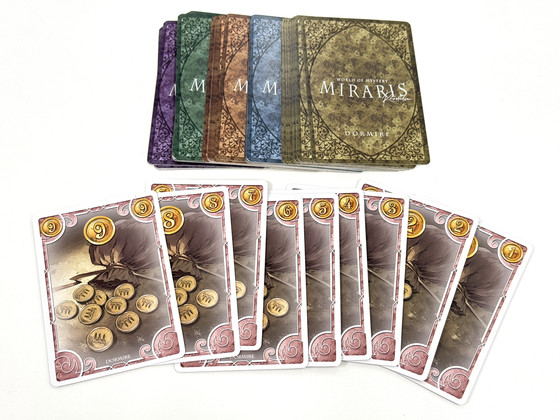
There are 15 character cards of 15 different types.
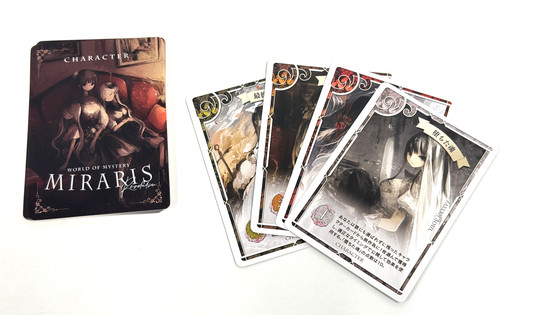
There are 53 miracle cards in 8 different types. They have from 1 to 7 crown marks on them, and players compete to see who has the most crown marks on all of their miracle cards.
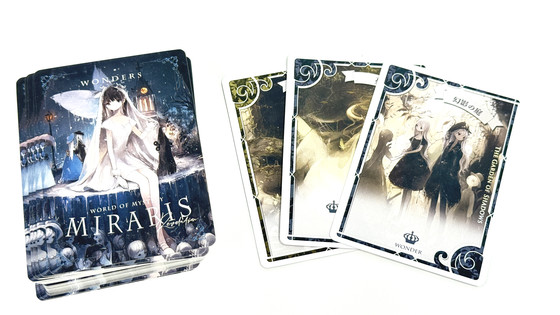
The revelation cards added to this game are cards that indicate expanded rules, and there are five of each type.

To prepare for the game, first shuffle all the character cards face down. Then, deal each player three cards face down if playing with 3 to 5 people, or two cards if playing with 6 people. Since we played with 4 people this time, we dealt each player three cards.
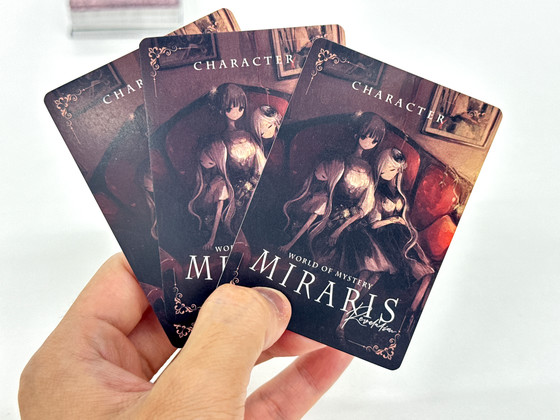
Each player will choose one of the three character cards they are dealt, and will then receive a set of nine Dormire cards.
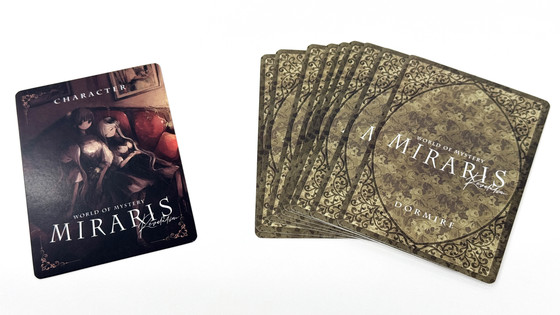
Put the remaining character cards aside and place the medal next to them.
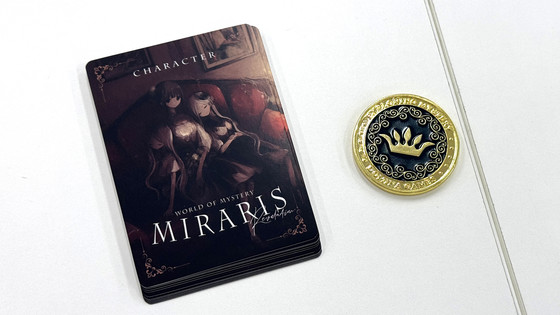
Next, shuffle all the miracle cards face down to create a deck, then flip over the same number of cards as the number of players. In this example, we placed four cards.

The game is very simple; each round you choose one of your Dormire cards and place it face down on the table.
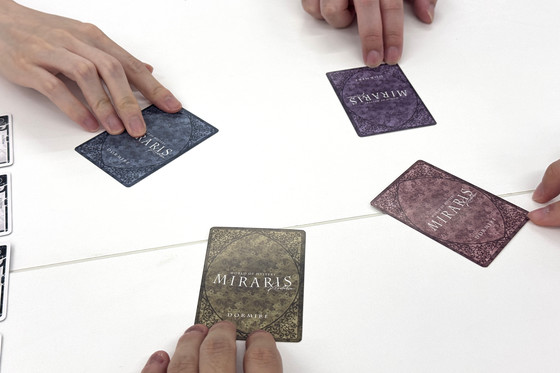
Next, everyone simultaneously flips over the Dormire card they have placed on the table.

The Dorumire cards have numbers from 1 to 9 written on them, so arrange them from left to right in ascending order under the miracle cards as shown below. Then, you get the miracle card on which your Dorumire card is placed. However, the point is that 'players who put out the same number of cards as other players cannot get the miracle card.' For example, in the following case, the red player and the blue player who put out the same Dorumire card with the number 1 cannot get the miracle card.
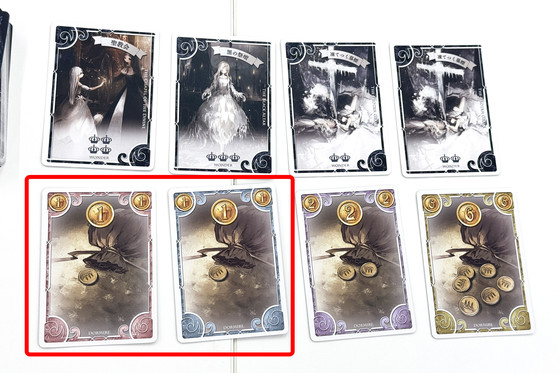
The miracle cards you get and the Dorumire cards you used will be kept face down in front of you. In other words, you cannot use a Dorumire card again after using it.
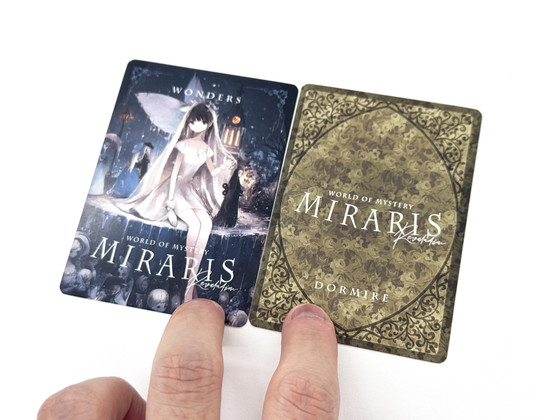
Then, the player places the number of miracle cards from the deck on the table again, equal to the number of players. However, any miracle cards that were not acquired due to overlapping Dorumire cards will remain on the table. Therefore, miracle cards are stacked as shown below. When you get a miracle card, you can also get the one that's on the stack, so you can aim for a large score. This is one round, and this is repeated eight times.
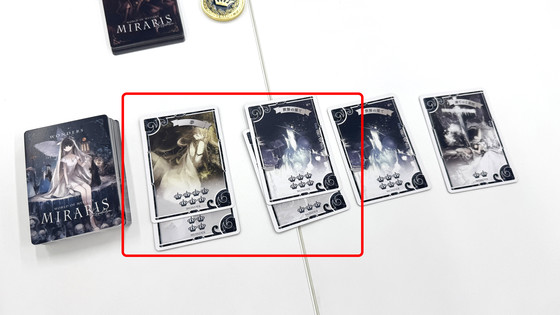
By getting two miracle cards, the victory points increased by 11 points at once. In other words, players need to think about things like 'choosing the number of Dorumire cards based on the size of the Dorumire cards and the order of the miracle cards,' 'figuring out how many Dorumire cards the opponent has played and playing a number of Dorumire cards that doesn't overlap with anyone else's,' and 'aiming for a large number of points by targeting the stacked Dorumire cards.'
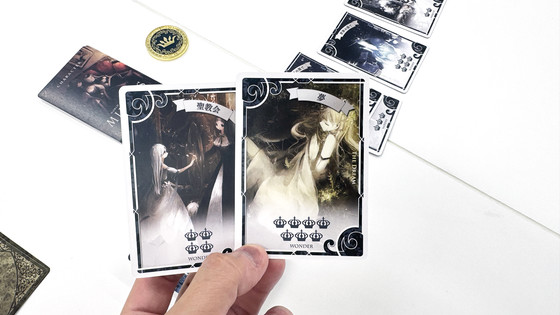
After the eight rounds are over, the score is calculated. First, players activate the effects of their character cards, starting with the player with the lowest number written on their character card. However, some character cards don't have numbers, so in that case, you can just skip it. For example, the 'Roland' card below has the amazing effect of 'If you collect seven or more miracle cards, you win the game.'
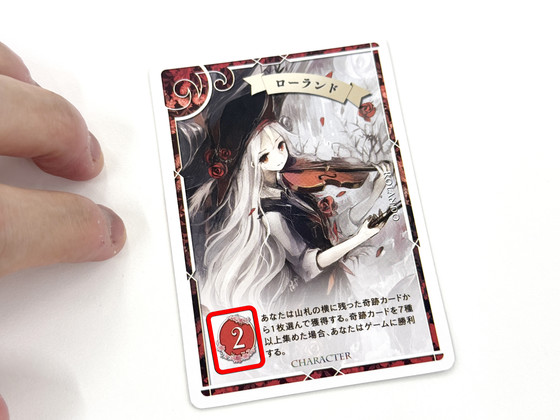
However, the player who had 'Roland' had six different miracle cards in his collection, but he did not have any of the two-crown miracle cards, so he did not reach the 'seven or more' mark.
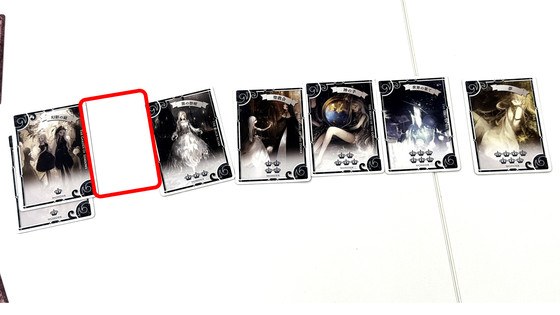
The 'Last Queen' gives players a 'medal' and has the effect of giving additional points depending on the final score of the player who is given that medal.

However, since the miracle cards you get are kept face down in front of you, you don't know how many miracle cards the players, including yourself, have collected. For that reason, you give medals to players who feel like they have collected a lot of miracle cards based on their memory and intuition.

Once the effects of the character cards have been resolved, each player turns over the miracle cards they have collected and counts the crown icons on them.
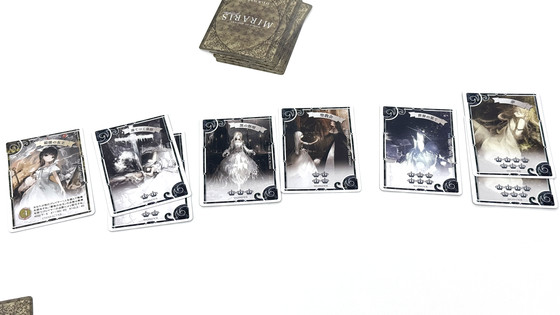
In addition, the effects of character cards that do not have numbers on them are also processed at this time. For example, the following 'Phantom Light' has the effect of multiplying the total points by the number of miracle cards called 'Phantom Garden'.
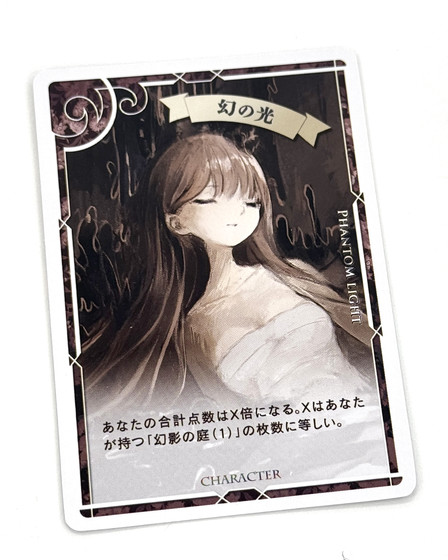
Looking at the miracle cards of the purple player who had 'Phantom Light', he had four 'Phantom Garden'. In other words, his total points were multiplied by four, and in the end, he had 27 points x 4 = 108 points. According to the purple player, 'I thought that the more 'Phantom Garden' I had, the higher my points would go, so I was really aiming to get it when it came on the table.'
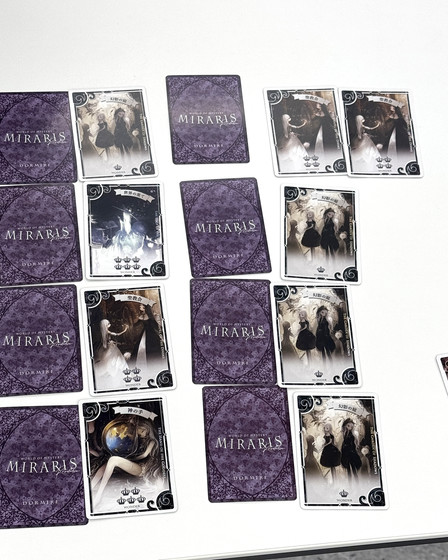
The 'Allie' held by the following players has the effect of getting 10 points for each of the two crown miracle cards 'Frozen Tombstone'. In fact, the player who had 'Roland' was unable to collect all seven types because the 'Allie' player was trying to get the two crown miracle cards.
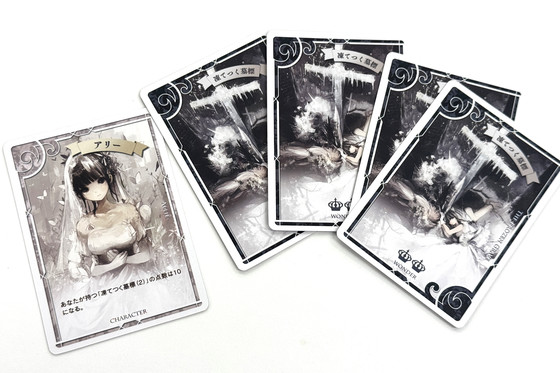
In addition, 'Miraris -Revelation-' also has an expansion rule that adds revelation cards. When preparing for the game, simply shuffle the five revelation cards, turn over only one, and add the rule that appears. For example, the following 'False World' states, 'At the start of the game, do not select a character card. All miracle card points become negative.'
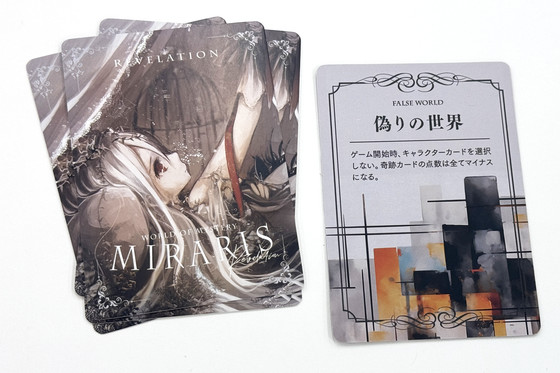
In other words, unlike the normal rules, you are required to 'avoid taking miracle cards as much as possible.' In order to avoid getting miracle cards, you need to play the same number of Dorumir cards as the other players.
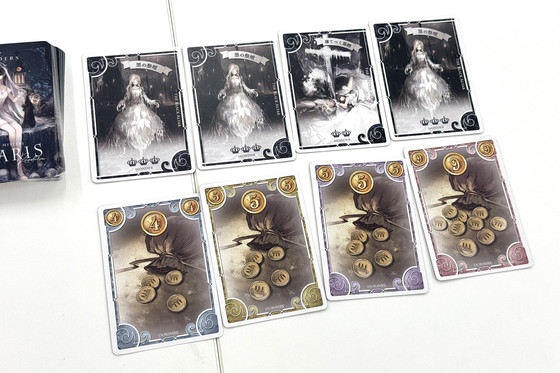
Each player tried to figure out what was going on inside their heads, saying, 'If we play that card, it will definitely be the same number,' and there was even a moment when all four players ended up playing the same number.
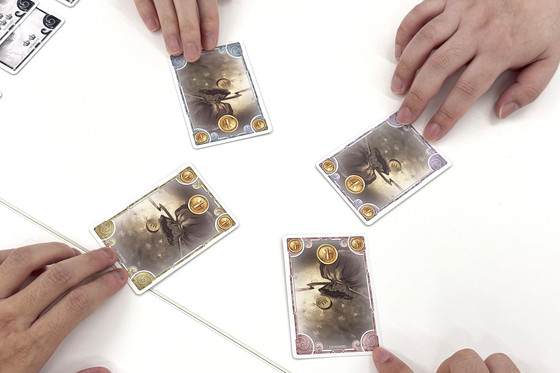
Also, because no one wanted to take a card, the miracle cards kept piling up. Each player tried to strategize, thinking, 'If I play a smaller number, I might be forced to take it,' or, 'It's best to play the smallest number to avoid the accumulated miracle cards.' As a result, the 8 Dorumire cards overlapped, and the player who was a little cautious and played the 7 Dorumire card ended up getting it.
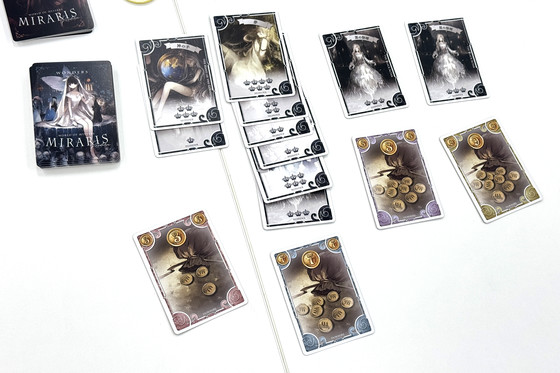
The game took about 15 minutes to complete. The rules are very simple, and you just collect miracle cards, but you have to think about 'how many of your Dormir cards to discard and when' while watching the other players' reactions, so I felt that it was quite strategic. In addition, the existence of character cards makes it highly replayable, and it is designed so that you will never get bored no matter how many times you play it.
Another advantage of 'Miraris -Revelation-' is that even beginners who are not familiar with analog games can quickly understand and play it. The simple rules mean that anyone can have fun playing it, making it the perfect party game.
'Miraris -Revelation-' costs 2,970 yen including tax, and at the time of writing, it can be purchased at Amazon.co.jp for 2,674 yen including tax.
Amazon | Domina Games Miraris -Revelation- (3-6 players, 10-20 minutes, ages 12 and up) Board Game | Board Games | Toys

Related Posts:








